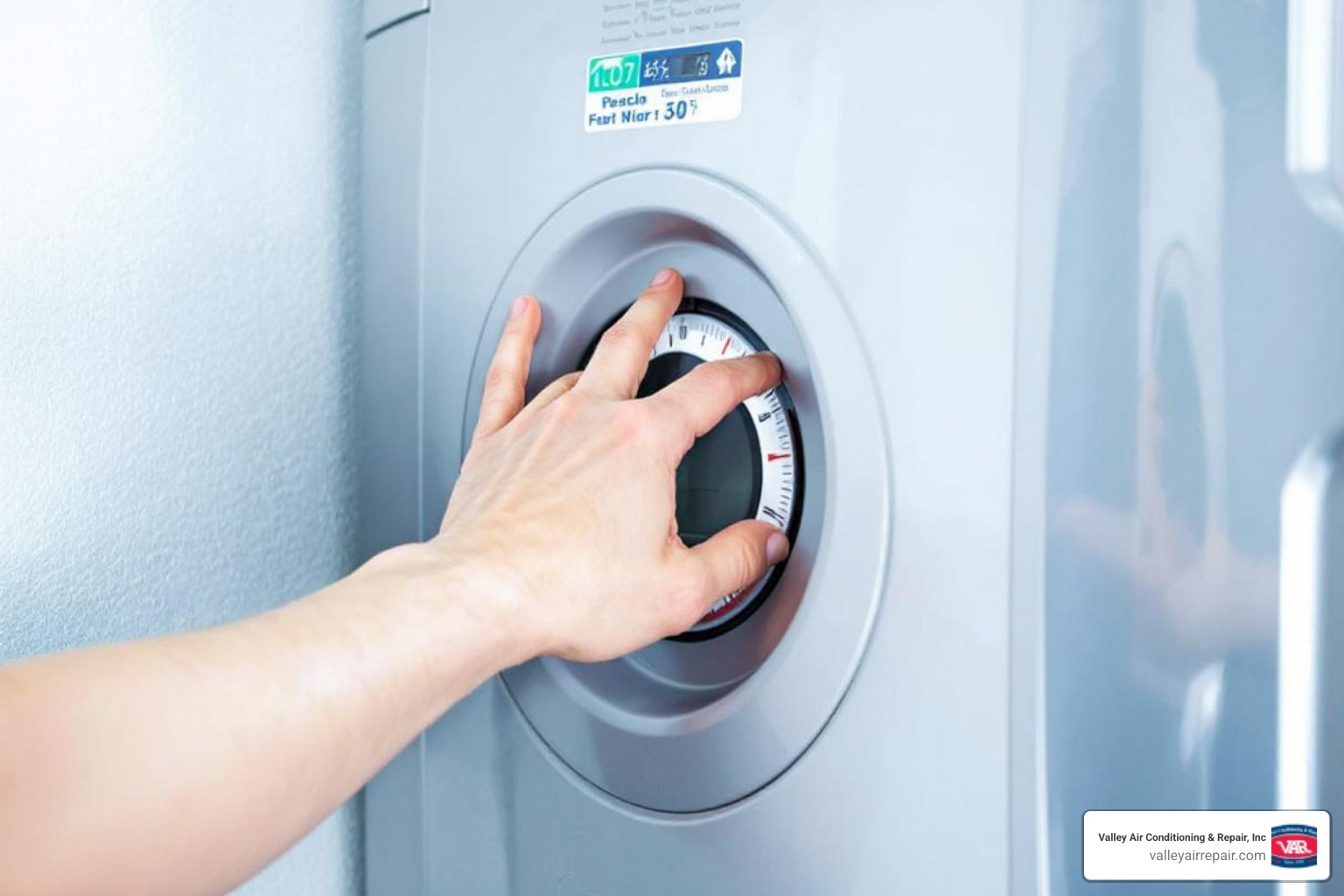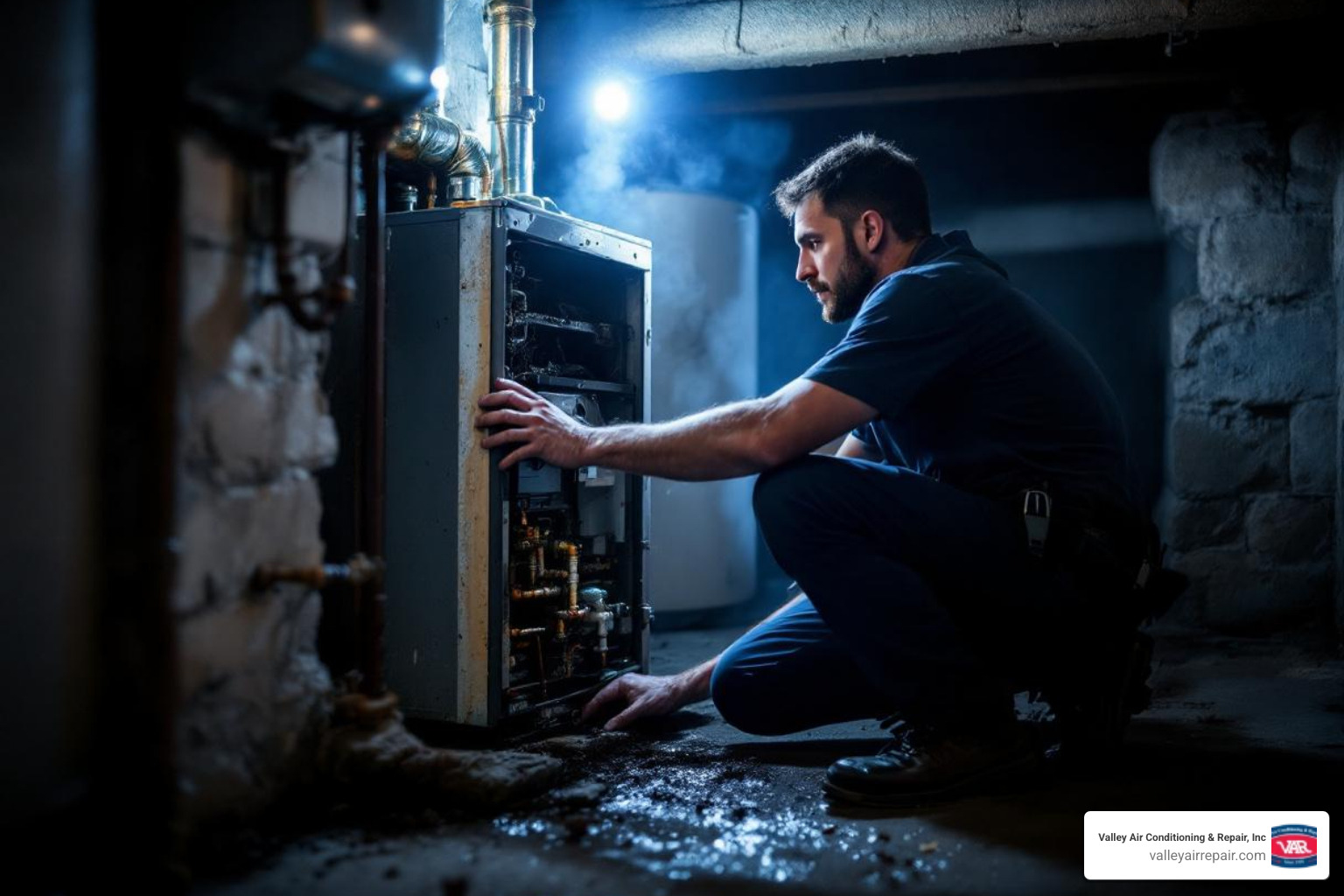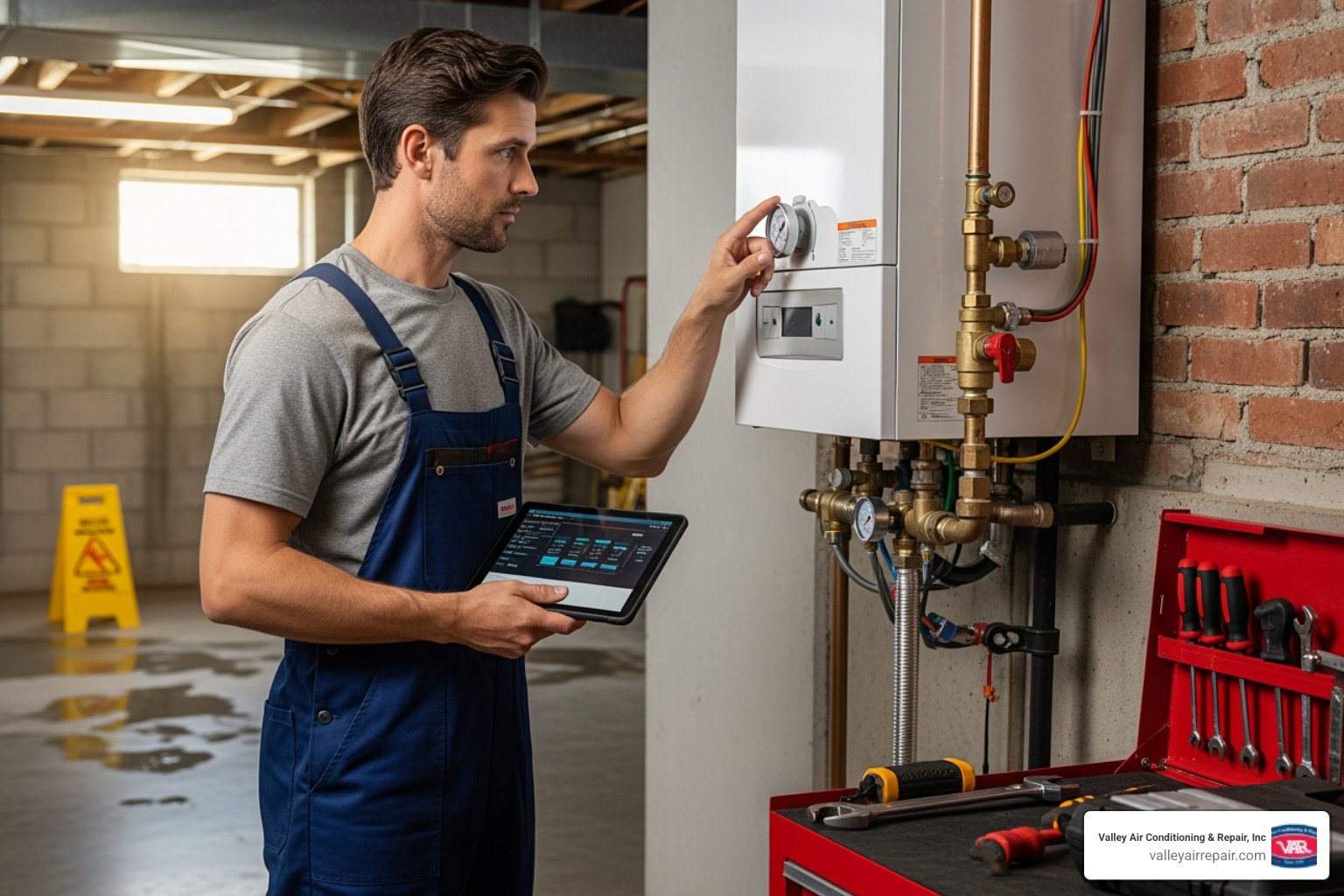A Simple AC System Inspection Guide to Avoid Getting Hot Under the Collar
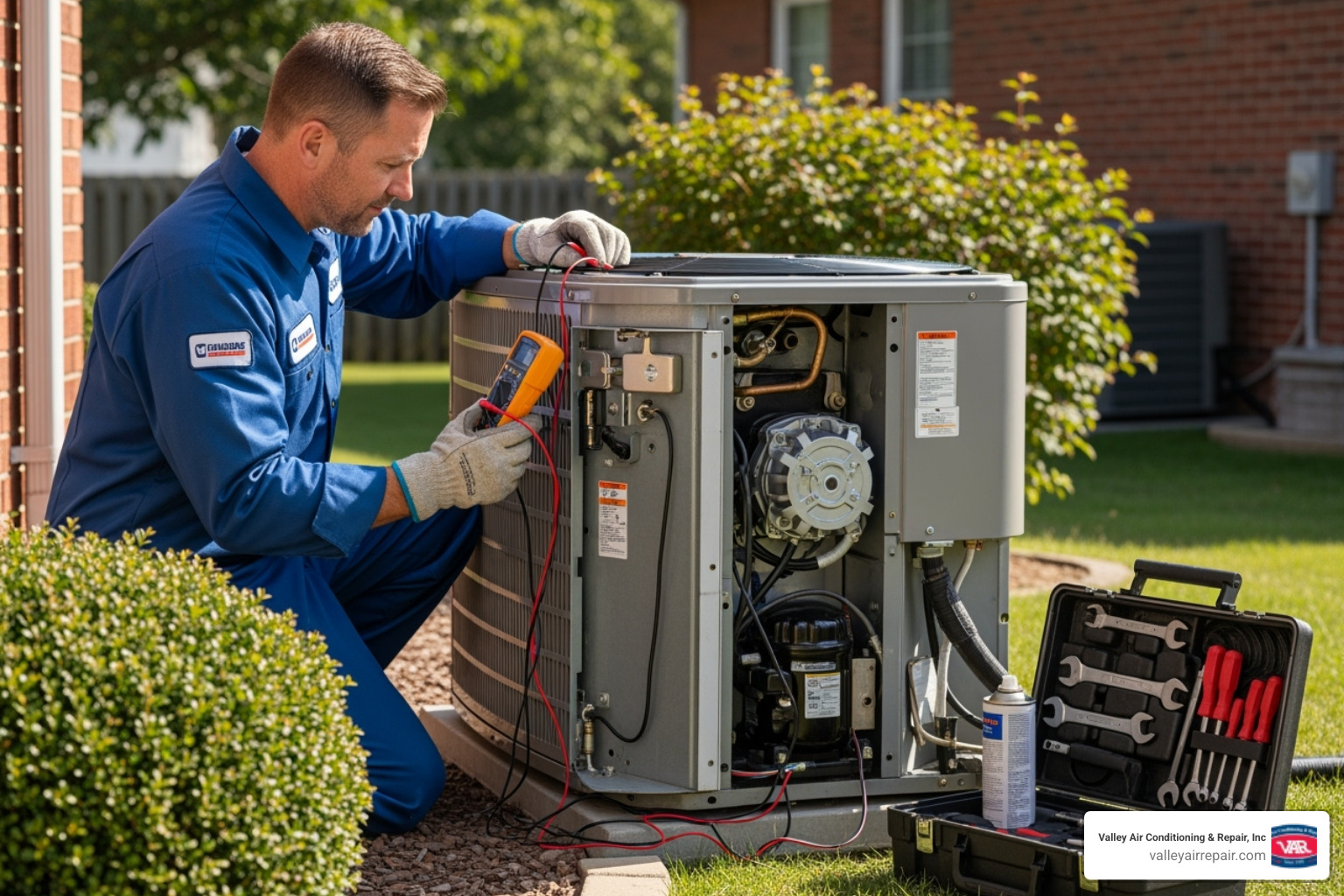
Why Your AC System Deserves Annual Attention
An ac system inspection is a thorough evaluation of your air conditioning system's components, performance, and safety features to ensure optimal operation and prevent costly breakdowns. Here's what you need to know:
Key Components Checked:
- Safety features - surge protectors, carbon monoxide detection, limit controls
- Cooling efficiency - refrigerant levels, evaporator coils, condensate drain
- Electrical components - thermostat, wiring, capacitors, contactors
- System services - air filters, airflow, equipment condition, duct seals
Inspection Frequency:
- At least once per year (ideally in spring)
- Twice per year if your unit is 10+ years old
- Takes 1-3 hours depending on system complexity
On a sweltering summer day, the last thing you want is your AC system to quit. Yet every year, countless homeowners find themselves in exactly this situation - sweating it out while waiting for emergency repairs that could have been prevented.
The good news? A simple annual inspection can catch small problems before they become expensive disasters. Regular maintenance extends your system's 15-year average lifespan, keeps your energy bills in check, and ensures your family stays comfortable when the heat is on.
Whether you tackle basic checks yourself or call in a certified professional, knowing what goes into a proper AC inspection puts you in control of your home's comfort and your wallet.
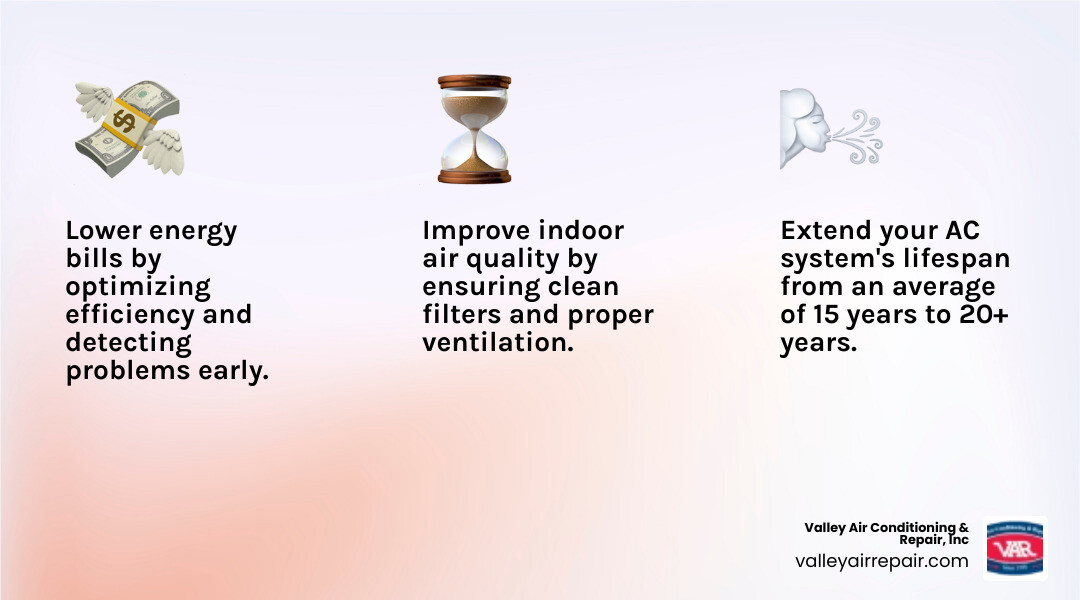
Why a Yearly AC Check-Up is Non-Negotiable
Picture this: it's the hottest day of summer, your family is counting on that sweet, cool air, and your AC decides to take an unscheduled vacation. We've all heard these horror stories, and trust us, you don't want to star in your own version.
Here's the thing a yearly AC system inspection isn't just another item on your home maintenance checklist. It's your insurance policy against sweltering nights and sky-high repair bills.
Energy efficiency is where the magic happens. When your AC runs smoothly, it doesn't have to work overtime to keep you comfortable. Think of it like a well-tuned car everything just runs better. Clean coils, proper refrigerant levels, and well-maintained components mean your system can cool your home without guzzling electricity like it's going out of style.
The cost savings are real, folks. We're talking about hundreds or even thousands of dollars staying in your pocket instead of going to the utility company. When your system is running efficiently, those monthly energy bills become a lot more manageable.
Your AC system is a significant investment typically lasting around 15 years with proper care. But here's the kicker: with regular maintenance and annual inspections, many systems push well beyond that timeline, sometimes reaching 20 years or more. It's like getting bonus years of comfort for free.
Those small problems that seem harmless today? They have a sneaky habit of becoming expensive disasters tomorrow. A failing capacitor caught early costs a fraction of what you'll pay when it takes out other components. Prevention really is the best medicine.
The air you breathe matters too. Your AC doesn't just control temperature it's working around the clock to filter and circulate the air in your home. Dirty filters, moldy coils, or leaky ductwork can turn your comfort system into a source of indoor air pollutants. If you've been dealing with poor air quality issues, your AC might be sending you a message.
Safety should never be an afterthought. Professional inspections catch electrical issues, ensure proper ventilation, and verify that safety controls are working correctly. In systems with integrated heating components, technicians also check for potential carbon monoxide risks something you definitely don't want to find the hard way.
Timing is everything when it comes to inspections. Schedule your AC system inspection in spring, before the cooling season kicks into high gear. It's like getting a head start on summer you'll know your system is ready when the heat arrives.
If your unit has been faithfully serving your family for 10 years or more, consider bumping up to twice-yearly inspections. Older systems need a bit more attention, and catching age-related issues early keeps them running strong.
The bottom line? Regular inspections turn potential disasters into minor maintenance tasks. Your future self will thank you when you're staying cool and comfortable while your neighbors are sweating it out, waiting for emergency repairs.
Your Comprehensive AC System Inspection Checklist
Understanding what goes into a thorough ac system inspection can feel a bit like deciphering a secret code, but it doesn't have to be! We're here to explain the process. A comprehensive inspection involves looking at every nook and cranny of your system, ensuring each part is pulling its weight. This section provides a detailed look at what's involved, breaking it down into tasks you can handle yourself and those best left to a certified professional.
DIY AC System Inspection: What You Can Safely Check
While some tasks absolutely require the expertise of a professional, theres plenty you can do to keep your AC system humming along and potentially spot issues before they become major headaches. Think of these as your first line of defense against a sweltering summer.
Heres a list of DIY ac system inspection steps you can safely perform:
- Thermostat Check: Start with the brains of the operation. Ensure your thermostat is functioning correctly by testing its settings. Can you switch between cooling and heating modes? Does it respond accurately to temperature changes? A smart thermostat can even help save money on utilities and provide better control.
- Shut Off Power: This is paramount! Before touching any part of your AC unit, always, always, always turn off the power at both the thermostat and the main breaker box. Safety first, folks!
- Clean Outdoor Unit (Condenser): Your outdoor unit, the condenser, works hard to expel heat. Over time, it can accumulate leaves, dirt, and debris. Gently remove any visible obstructions from the exterior. You can use a garden hose to rinse off the condenser coils from the inside out, but avoid using a pressure washer, which can damage the delicate fins. Trim back any foliage or overgrown plants by at least two feet to ensure proper airflow around the unit.
- Clear Debris & Straighten Fins: After removing the fan cage (with the power off!), gently clear any internal debris like twigs or spiderwebs. The thin metal fins on the condenser unit can easily get bent, restricting airflow. Use a fin comb (or even a butter knife, carefully!) to gently straighten any bent fins.
- Check for Level Unit: Believe it or not, your outdoor unit needs to be level. An unlevelled unit can put undue stress on the compressor, potentially shortening its lifespan. Use a level tool to check. If its off, you can use rot-resistant shims to correct it.
- Inspect Air Filter: This is one of the easiest and most impactful DIY tasks. Locate your air filter (it could be in your indoor air handler or behind a return vent). Hold it up to the light. If you can't see through it, it's time for a change. Dirty filters restrict airflow, making your system work harder and reducing efficiency. We recommend replacing your air filter every 1-3 months, depending on usage, pets, and allergies. Remember to note the direction of the airflow arrow on the new filter!
- Check Condensate Drain Line: The condensate drain line removes moisture from your home. If it gets clogged with algae or debris, water can back up, leading to leaks, water damage, and even system shutdowns. Look for standing water around the indoor unit or a clogged drain pan. You can often clear minor clogs by flushing the line with a mixture of vinegar and water.
- Inspect Visible Ductwork: Take a peek at any accessible ductwork in your attic, basement, or crawl space. Look for obvious leaks, tears, or disconnected sections. According to ENERGY STAR, about 20 - 30% of the air moving through your ducts can be lost due to leaks, holes, and poorly connected sections. While major repairs require a pro, you can seal minor leaks with mastic sealant or aluminum foil tape (not regular duct tape, despite the name!).
- Ensure Vents Are Open and Clear: Walk around your home and make sure all supply and return vents are open and unobstructed by furniture, drapes, or rugs. Contrary to popular belief, closing vents in unused rooms can actually disrupt your system's balance and lead to inefficiencies. Keeping them all open allows your duct system to flow freely as designed.
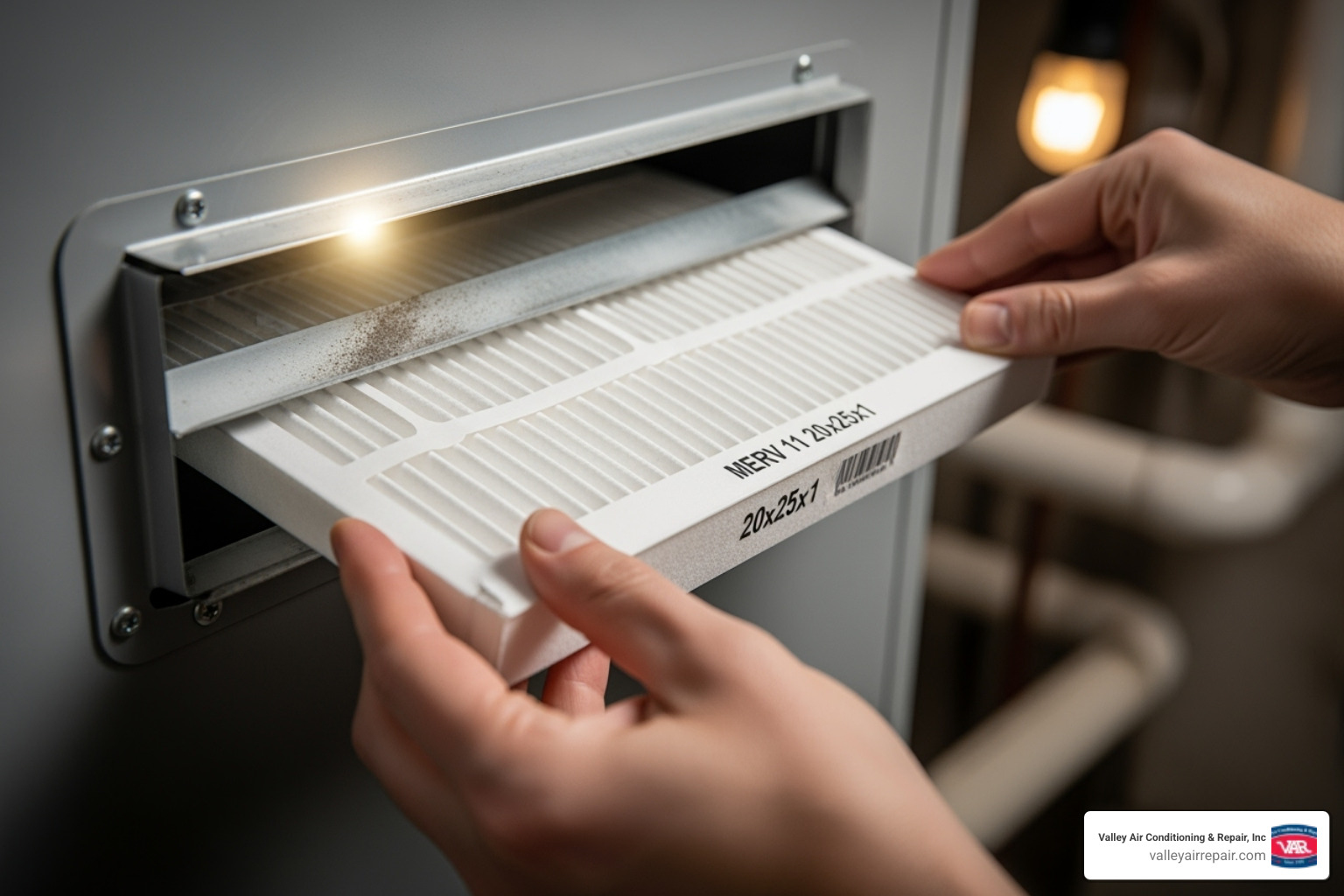
Professional AC System Inspection: When to Call the Experts
While DIY checks are incredibly helpful, some aspects of an ac system inspection require specialized tools, training, and a deep understanding of HVAC mechanics. This is where our certified technicians come in. We strongly recommend a professional tune-up at least once a year, especially before the cooling season, to ensure your system is operating safely and at peak efficiency.
Heres what a professional inspection typically covers:
- Electrical Components: This is where things get serious, and safety is paramount. Professionals carefully inspect all electrical connections, fuses, wiring, capacitors, and contactors. They check voltage and amperage, ensuring everything is within safe operating parameters. Faulty electrical components can lead to system failures, fire hazards, or increased energy consumption. We never recommend homeowners attempt to inspect or repair these components themselves.
- Refrigerant Levels and Leaks: The refrigerant is the lifeblood of your AC system, absorbing heat from your home. Low refrigerant levels often indicate a leak, which not only reduces cooling efficiency but can also damage your compressor. Our technicians use specialized equipment to accurately check refrigerant charge and levels. If a leak is detected, they can pinpoint its source and recommend appropriate repairs, which is a task strictly for certified professionals due to environmental and safety regulations.
- Blower Motor and Assembly: The blower motor is responsible for circulating air throughout your home. Technicians inspect the motor for wear, lubricate moving parts (if applicable), and check the blower wheel for cleanliness and balance. A dirty or failing blower can significantly reduce airflow and increase energy usage.
- Evaporator Coils and Condenser Coils: These coils are critical for heat exchange. Over time, they can accumulate dirt, dust, and grime, which acts as an insulator, hindering the heat transfer process. Professionals deep-clean these coils using specialized cleaners, restoring their efficiency. They also check for any physical damage or corrosion.
- Full System Diagnostics: Beyond individual components, a professional ac system inspection involves a comprehensive assessment of the entire system's performance. This includes checking the compressor, condenser fan, and overall airflow. They'll listen for unusual noises (like grinding, squealing, or thumping) that could indicate internal wear or pressure issues. They also inspect the line set, duct seals, registers, and vents for optimal airflow and efficiency.
- Safety Controls and System Integrity: A professional inspection includes checking all safety devices, limit controls, and surge protectors to ensure they are functioning correctly. This is vital for protecting your home and preventing potential hazards. They'll also check for any signs of pest infestations within the unit or ductwork.
While the cost of a professional inspection might seem like an added expense, it's an investment that pays for itself many times over by preventing costly breakdowns, extending your system's life, and keeping your energy bills low. For reliable and thorough regular maintenance, we're here to help.
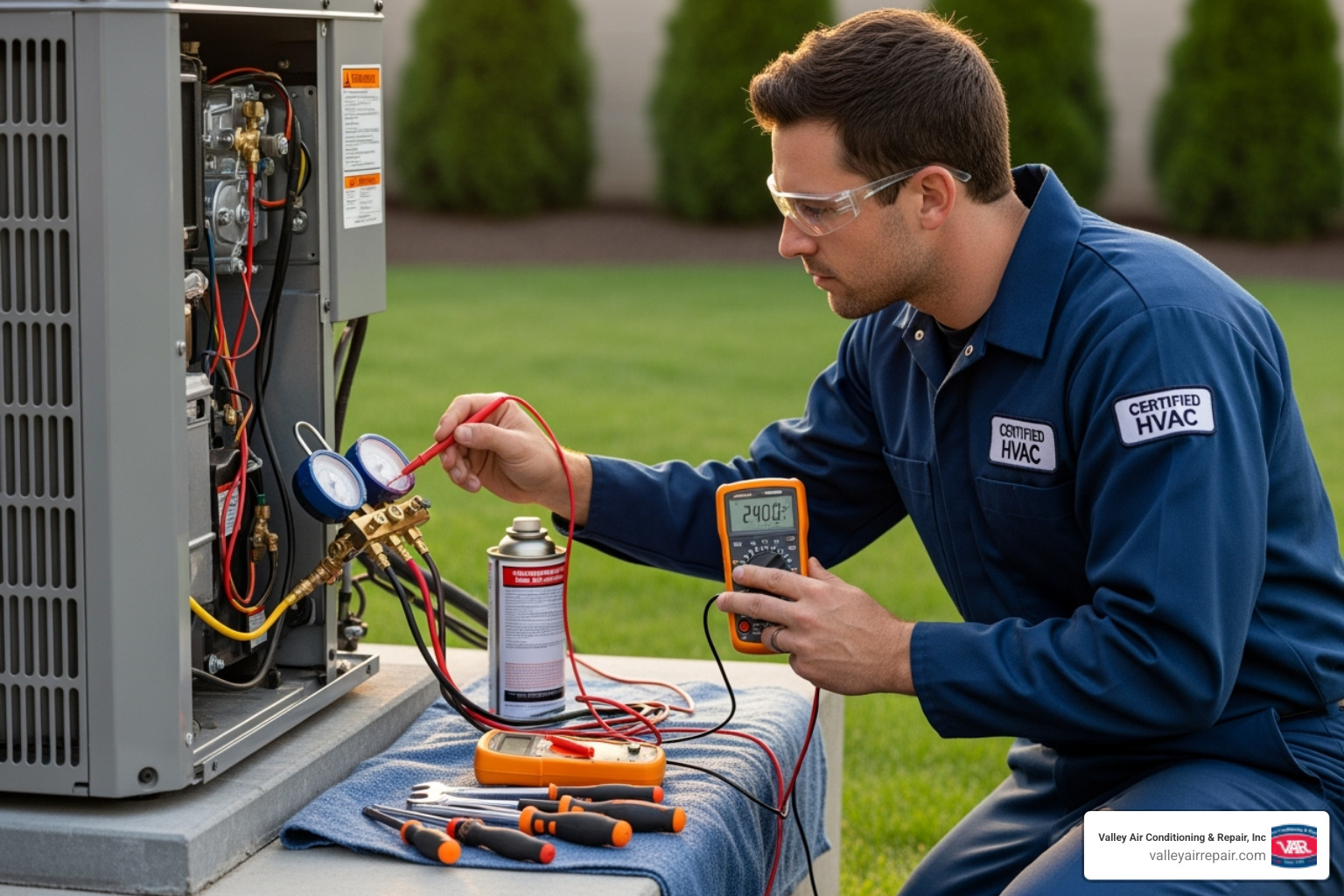
Common Problems Uncovered During an Inspection
Think of an ac system inspection as a detective story and our technicians are the detectives uncovering clues that tell the tale of your system's health. Over the years, we've seen it all, from simple fixes that take minutes to more serious issues that could leave you sweating through a heat wave. The good news? Catching these problems early during a routine inspection can save you from uncomfortable surprises and hefty repair bills.
Dirty or clogged air filters top our list of usual suspects. You'd be amazed how often we find filters so packed with dust and debris that they look like they've been through a sandstorm! When your filter can't breathe, neither can your AC system. It has to work overtime just to push air through that blockage, which means higher energy bills and a system that's struggling to keep you cool.
Another frequent troublemaker is a clogged condensate drain line. Your AC works hard to pull moisture from the air that's part of what makes your home feel comfortable. But when that moisture has nowhere to go because the drain line is blocked with algae or debris, you're looking at potential water damage, mold growth, and a system that might just shut itself down as a safety precaution.
Low refrigerant levels often signal a bigger problem lurking beneath the surface. Refrigerant doesn't just disappear if it's low, there's usually a leak somewhere in the system. This means your AC can't absorb heat effectively, leaving you with lukewarm air and a compressor that's working itself to death trying to compensate.
The electrical side of things can be tricky too. Faulty wiring or electrical components like capacitors and contactors wear out over time. You might notice your system making strange humming sounds, randomly shutting off, or refusing to start altogether. These aren't just inconveniences they can be safety hazards that require immediate professional attention.
When your blower motor starts dying, it's like having a car with a failing engine. You'll notice weak airflow, strange grinding or screeching noises, and rooms that just won't seem to cool down properly. The motor is what moves all that lovely cool air through your home, so when it's struggling, your comfort suffers.
Here's where things get serious: a cracked heat exchanger in your heating system poses a real danger. This can allow carbon monoxide to leak into your home an odorless, invisible threat that can cause severe illness or worse. This is exactly why we check for carbon monoxide poisoning risks during our inspections and why having working CO detectors is absolutely essential.
Finally, leaky ductwork is like having holes in your wallet you're literally paying to cool air that's escaping before it ever reaches your living spaces. According to ENERGY STAR, 20 - 30% of your conditioned air can be lost through leaks, holes, and poorly connected sections. That's like throwing money out the window!
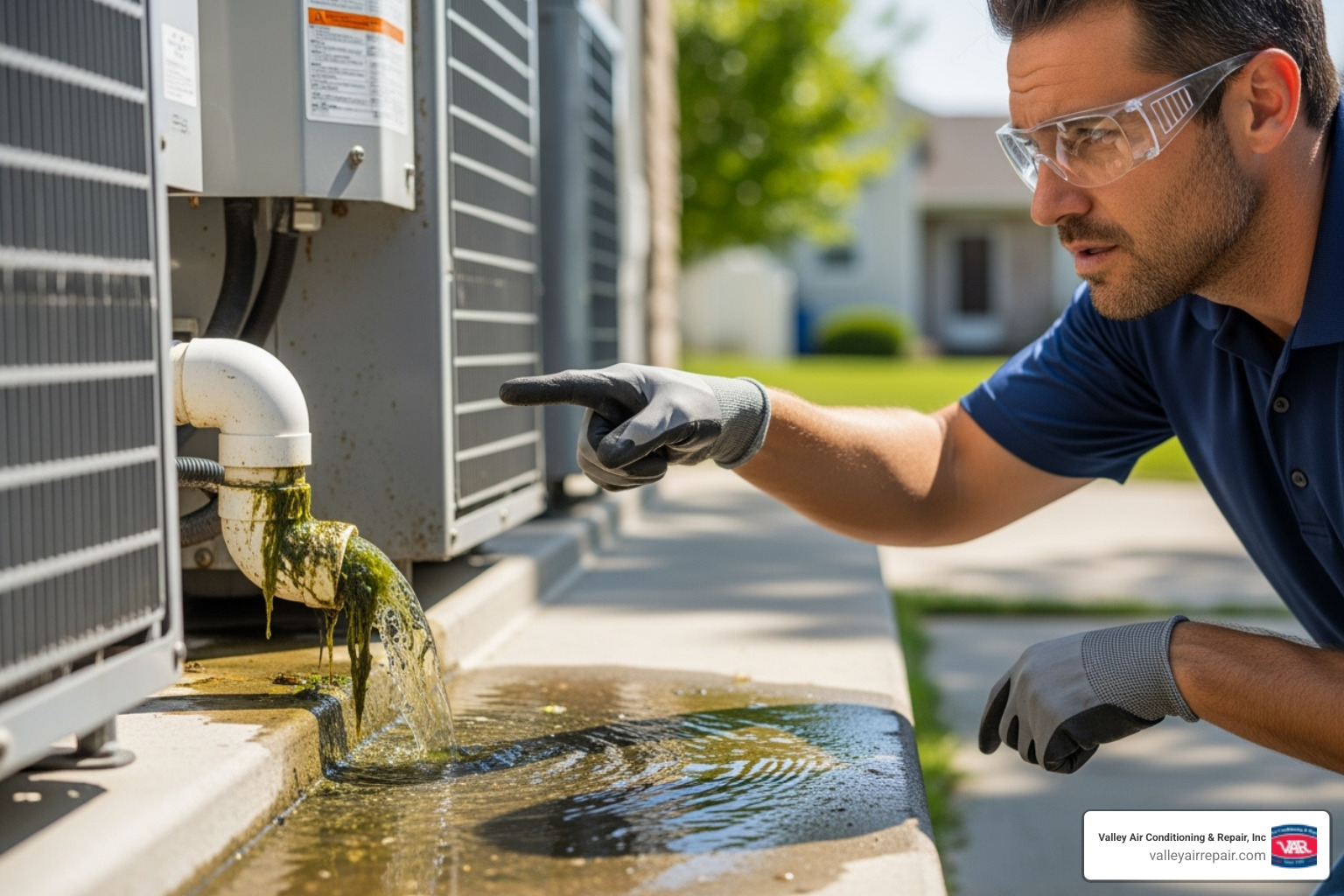
The beauty of a thorough ac system inspection is that it catches these issues while they're still manageable. A small repair today can prevent a major breakdown tomorrow and trust us, your future self will thank you when you're staying cool and comfortable while your neighbors are dealing with emergency repair calls on the hottest day of the year.
Frequently Asked Questions about AC Inspections
Let's be honest – when it comes to AC system inspection, most homeowners have plenty of questions swirling around in their heads. We've been in the Valley helping folks stay cool since 1970, so we've heard just about every question you can imagine. Here are the ones that come up most often, along with our straight-shooting answers.
How often should I have my AC system inspected?
Here's the golden rule: get a professional AC system inspection at least once a year, preferably in spring before you really need that cool air. Think of it like your annual doctor's visit – you wouldn't skip that, right?
Spring timing makes perfect sense because it gives you a chance to fix any problems before the summer heat hits. Nobody wants to find their AC is on the fritz during the first 100-degree day of the year!
Now, if your system is getting up there in age – say 10 years or older – we'd recommend bumping that up to twice a year. Spring for your cooling system, fall for your heating. Older units are like vintage cars: they need a little more TLC to keep running smoothly. Plus, catching small issues early becomes even more important as components naturally start showing their age.
How long does an AC inspection take?
Most AC system inspections take between 60 to 90 minutes from start to finish. That's enough time for our technicians to give your system a thorough once-over without rushing through the important stuff.
Of course, every home is different. If we find issues that need immediate attention – like low refrigerant that needs topping off or a component that's crying out for replacement – we might be there a bit longer. We'd rather take the extra time to get things right than leave you with a half-fixed system.
The good news is that we'll always explain what we're doing and why. No mysterious disappearing acts or confusing technical jargon – just honest communication about what your system needs.
Can an AC inspection really save me money?
This is probably our favorite question because the answer is a resounding yes! While nobody loves spending money upfront, an AC system inspection is one of those rare expenses that actually puts money back in your pocket.
Energy savings alone can be substantial. When your system is running efficiently – with clean coils, proper refrigerant levels, and good airflow – it doesn't have to work as hard to cool your home. We've seen homeowners save hundreds of dollars annually just from having a well-maintained system.
Preventing major breakdowns is where the real savings kick in. Catching a failing capacitor during an inspection costs a fraction of what you'd pay for emergency repairs when your compressor fails on a scorching Saturday afternoon. Emergency calls are never cheap, and they always seem to happen at the worst possible times.
Extending your system's life is another huge money-saver. The average AC system lasts about 15 years, but with regular care, many units keep chugging along well beyond that. When you consider the cost of a full system replacement, getting even a few extra years out of your current unit represents serious savings.
The bottom line? Regular inspections turn what could be expensive surprises into manageable, planned maintenance. Your wallet – and your stress levels – will thank you for it.
Stay Cool and Confident with a Professional Tune-Up
Regular ac system inspection is truly the foundation of a reliable, efficient air conditioning system that you can count on year after year. While those DIY checks we covered are fantastic for keeping you involved in your system's health, there's something to be said for the peace of mind that comes with a professional tune-up.
Think about it this way: you can change your car's oil and check the tire pressure, but when it comes to a full diagnostic and tune-up, you trust a mechanic, right? The same principle applies to your AC system. A professional inspection provides that deep clean your system craves, along with the expert analysis that only comes from years of experience working with HVAC systems day in and day out.
When a certified technician performs your ac system inspection, they're not just checking boxes on a list. They're using specialized tools and their trained eye to spot potential issues that might not be obvious to the rest of us. They can hear when a motor sounds just a little off, or notice when electrical connections are starting to show signs of wear. It's this level of expertise that ensures your system isn't just running, but running safely and at its absolute best.
The beauty of professional maintenance is that it's about so much more than just keeping things cool. It's about creating a comfortable, healthy environment for your family. It's about knowing that when the summer heat hits full force, your system is ready. And let's be honest, it's about avoiding that sinking feeling when you flip the switch on the first hot day of the year and nothing happens.
For homeowners in the Valley who want thorough and trustworthy service, Valley Air Conditioning & Repair, Inc. has been the go-to choice since 1970. Our approach has always been simple: treat every customer like family, provide honest advice, and deliver quality work that stands the test of time. That customer-first philosophy has built our reputation one satisfied homeowner at a time, and it's why families in Fresno, Clovis, Madera, Selma, and throughout the surrounding communities trust us with their comfort.
Don't wait until your AC system decides to take an unscheduled vacation on the hottest day of the year. Being proactive with your maintenance not only saves you money in the long run but ensures your home remains that cool, comfortable sanctuary you deserve all season long.




.webp)


